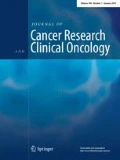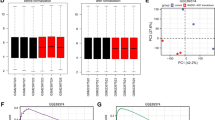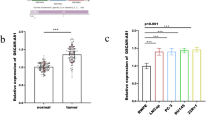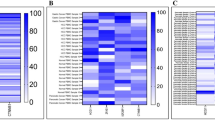Abstract
Objective
Renal cell carcinoma (RCC) is the most common malignancy of the urinary system, and it is a serious threat to human health. HOXA transcript at the distal tip (HOTTIP), located at the 5′ end of the HOXA locus, is a long non-coding RNA that has been newly discovered in recent years. It has been reported to promote the development of several types of tumors. Moreover, accumulating evidence has indicated that autophagy plays an important role in tumor cell survival or death. However, whether HOTTIP affects RCC development by regulating autophagy remains unknown.
Methods
In this study, we first measured HOTTIP expression in 42 paired RCC and adjacent non-tumor tissues, as well as in 4 RCC cell lines and 1 normal renal tubular epithelial cell line. Then, we selected 2 RCC cell lines to silence HOTTIP expression and 1 RCC cell line to overexpress HOTTIP, and we measured their proliferation, migration and invasion, as well as autophagy, after pretreatment with an autophagy inhibitor or inducer. In addition, we assessed the growth, metastasis and autophagy of tumors in nude mice and explored the mechanism involved.
Results
The results showed that HOTTIP expression was significantly upregulated in the RCC tissues and cell lines, and it was closely associated with TNM stage, histological grade, lymph node metastasis and patient prognosis. The in vitro and in vivo assays indicated that HOTTIP silencing inhibited RCC cell proliferation, migration and invasion and induced autophagy, and 3-MA (an autophagy inhibitor) reversed these effects. In contrast, HOTTIP overexpression and rapamycin (an autophagy inducer) yielded the opposite results. Further research revealed that HOTTIP modification could affect RCC cell autophagy via the PI3K/Akt/Atg13 signaling pathway.
Conclusions
Our study will help in finding a potential marker for RCC diagnosis and supply a target molecule for RCC treatment.






Similar content being viewed by others
References
Avalos Y, Canales J, Bravo-Sagua R, Criollo A, Lavandero S, Quest AF (2014) Tumor suppression and promotion by autophagy. Biomed Res Int 2014:603980
Banreti A, Hudry B, Sass M, Saurin AJ, Graba Y (2014) Hox proteins mediate developmental and environmental control of autophagy. Dev Cell 28:56–69
Chang S, Liu J, Guo S, He S, Qiu G, Lu J, Wang J, Fan L, Zhao W, Che X (2016) HOTTIP and HOXA13 are oncogenes associated with gastric cancer progression. Oncol Rep 35:3577–3585
Chen S, Wang C, Yeo S, Liang CC, Okamoto T, Sun S, Wen J, Guan JL (2016) Distinct roles of autophagy-dependent and -independent functions of FIP200 revealed by generation and analysis of a mutant knock-in mouse model. Genes Dev 30:856–869
Chen S, Ma P, Zhao Y, Li B, Jiang S, Xiong H, Wang Z, Wang H, Jin X, Liu C (2017) Biological function and mechanism of MALAT-1 in renal cell carcinoma proliferation and apoptosis: Role of the MALAT-1-Livin protein interaction. J Physiol Sci 67:577–585
Deng Q, Wang Z, Wang L, Zhang L, Xiang X, Wang Z, Chong T (2013) Lower mRNA and protein expression levels of LC3 and Beclin1, markers of autophagy, were correlated with progression of renal clear cell carcinoma. Jpn J Clin Oncol 43:1261–1268
Ellinger J, Gevensleben H, Muller SC, Dietrich D (2016) The emerging role of non-coding circulating RNA as a biomarker in renal cell carcinoma. Expert Rev Mol Diagn 16:1059–1065
Follo C, Cheng Y, Richards WG, Bueno R, Broaddus VC (2018) Inhibition of autophagy initiation potentiates chemosensitivity in mesothelioma. Mol Carcinog 57:319–332
Fu Z et al (2017) LncRNA HOTTIP modulates cancer stem cell properties in human pancreatic cancer by regulating HOXA9. Cancer Lett 410:68–81
Gao Q, Liu H, Yao Y, Geng L, Zhang X, Jiang L, Shi B, Yang F (2015) Carnosic acid induces autophagic cell death through inhibition of the Akt/mTOR pathway in human hepatoma cells. J Appl Toxicol 35:485–492
Hale AN, Ledbetter DJ, Gawriluk TR, Rucker EB (2013) Autophagy: Regulation and role in development. Autophagy 9:951–972
Hong Q, Li O, Zheng W, Xiao WZ, Zhang L, Wu D, Cai GY, He JC, Chen XM (2017) LncRNA HOTAIR regulates HIF-1α/AXL signaling through inhibition of miR-217 in renal cell carcinoma. Cell Death Dis 8:e2772
Ikeda T, Ishii KA, Saito Y, Miura M, Otagiri A, Kawakami Y, Shimano H, Hara H, Takekoshi K (2013) Inhibition of autophagy enhances sunitinib-induced cytotoxicity in rat pheochromocytoma PC12 cells. J Pharmacol Sci 121:67–73
Khorkova O, Hsiao J, Wahlestedt C (2015) Basic biology and therapeutic implications of lncRNA. Adv Drug Deliv Rev 87:15–24
Kroemer G, Marino G, Levine B (2010) Autophagy and the integrated stress response. Mol Cell 40:280–293
Li X, Wu Z, Fu X, Han W (2014) LncRNAs: insights into their function and mechanics in underlying disorders. Mutat Res Rev Mutat Res 762:1–21
Li Z et al (2015) The long non-coding RNA HOTTIP promotes progression and gemcitabine resistance by regulating HOXA13 in pancreatic cancer. J Transl Med 13:84
Li L et al (2016) Long noncoding RNA MALAT1 promotes aggressive pancreatic cancer proliferation and metastasis via the stimulation of autophagy. Mol Cancer Ther 15:2232–2243
Li JK et al (2017) Long noncoding RNA MRCCAT1 promotes metastasis of clear cell renal cell carcinoma via inhibiting NPR3 and activating p38-MAPK signaling. Mol Cancer 16:111
Lian Y, Cai Z, Gong H, Xue S, Wu D, Wang K (2016) HOTTIP: A critical oncogenic long non-coding RNA in human cancers. Mol Biosyst 12:3247–3253
Murai M, Oya M (2004) Renal cell carcinoma: Etiology, incidence and epidemiology. Curr Opin Urol 14:229–233
Nishikawa M, Miyake H, Liu B, Fujisawa M (2015) Expression pattern of autophagy-related markers in non-metastatic clear cell renal cell carcinoma: Association with disease recurrence following radical nephrectomy. J Cancer Res Clin Oncol 141:1585–1591
Parzych KR, Klionsky DJ (2014) An overview of autophagy: Morphology, mechanism, and regulation. Antioxid Redox Signal 20:460–473
Pastore AL, Palleschi G, Silvestri L, Moschese D, Ricci S, Petrozza V, Carbone A, Di Carlo A (2015) Serum and urine biomarkers for human renal cell carcinoma. Dis Markers 2015:251403
Ponting CP, Oliver PL, Reik W (2009) Evolution and functions of long noncoding RNAs. Cell 136:629–641
Pradeepa MM, McKenna F, Taylor GC, Bengani H, Grimes GR, Wood AJ, Bhatia S, Bickmore WA (2017) Psip1/p52 regulates posterior Hoxa genes through activation of lncRNA Hottip. PLoS Genet 13:e1006677
Prensner JR, Chinnaiyan AM (2011) The emergence of lncRNAs in cancer biology. Cancer Discov 1:391–407
Puente C, Hendrickson RC, Jiang X (2016) Nutrient-regulated phosphorylation of ATG13 inhibits starvation-induced autophagy. J Biol Chem 291:6026–6035
Qin C et al (2014) Expression pattern of long non-coding RNAs in renal cell carcinoma revealed by microarray. PLoS One 9:e99372
Quagliata L et al (2014) Long noncoding RNA HOTTIP/HOXA13 expression is associated with disease progression and predicts outcome in hepatocellular carcinoma patients. Hepatology 59:911–923
Roux C, Lesueur C, Aligny C, Brasse-Lagnel C, Genty D, Marret S, Laquerriere A, Bekri S, Gonzalez BJ (2014) 3-MA inhibits autophagy and favors long-term integration of grafted Gad67-GFP GABAergic precursors in the developing neocortex by preventing apoptosis. Cell Transplant 23:1425–1450
Schwab K, Hartman HA, Liang HC, Aronow BJ, Patterson LT, Potter SS (2006) Comprehensive microarray analysis of Hoxa11/Hoxd11 mutant kidney development. Dev Biol 293:540–554
Seles M, Hutterer GC, Kiesslich T, Pummer K, Berindan-Neagoe I, Perakis S, Schwarzenbacher D, Stotz M, Gerger A, Pichler M (2016) Current insights into long non-coding RNAs in renal cell carcinoma. Int J Mol Sci 17:573
Shibutani ST, Saitoh T, Nowag H, Munz C, Yoshimori T (2015) Autophagy and autophagy-related proteins in the immune system. Nat Immunol 16:1014–1024
Shimizu S, Yoshida T, Tsujioka M, Arakawa S (2014) Autophagic cell death and cancer. Int J Mol Sci 15:3145–3153
Siegel RL, Miller KD, Jemal A (2015) Cancer statistics, 2015. CA Cancer J Clin 65:5–29
Sun Y, Zhou Y, Bai Y, Wang Q, Bao J, Luo Y, Guo Y, Guo L (2017) A long non-coding RNA HOTTIP expression is associated with disease progression and predicts outcome in small cell lung cancer patients. Mol Cancer 16:162
Thorburn A, Thamm DH, Gustafson DL (2014) Autophagy and cancer therapy. Mol Pharmacol 85:830–838
Turcotte S, Sutphin PD, Giaccia AJ (2008) Targeted therapy for the loss of von Hippel-Lindau in renal cell carcinoma: a novel molecule that induces autophagic cell death. Autophagy 4:944–946
Uchida S, Dimmeler S (2015) Long noncoding RNAs in cardiovascular diseases. Circ Res 116:737–750
Wang H et al (2014) LncRNA-regulated infection and inflammation pathways associated with pregnancy loss: genome wide differential expression of lncRNAs in early spontaneous abortion. Am J Reprod Immunol 72:359–375
Wang L, Cui Y, Sheng J, Yang Y, Kuang G, Fan Y, Jin J, Zhang Q (2017) Epigenetic inactivation of HOXA11, a novel functional tumor suppressor for renal cell carcinoma, is associated with RCC TNM classification. Oncotarget 8:21861–21870
White E (2015) The role for autophagy in cancer. J Clin Invest 125:42–46
Williams RT, Yu AL, Diccianni MB, Theodorakis EA, Batova A (2013) Renal cancer-selective Englerin a induces multiple mechanisms of cell death and autophagy. J Exp Clin Cancer Res 32:57
Wu Y, Liu J, Zheng Y, You L, Kuang D, Liu T (2014) Suppressed expression of long non-coding RNA HOTAIR inhibits proliferation and tumourigenicity of renal carcinoma cells. Tumour Biol 35:11887–11894
Wu GC, Pan HF, Leng RX, Wang DG, Li XP, Li XM, Ye DQ (2015) Emerging role of long noncoding RNAs in autoimmune diseases. Autoimmun Rev 14:798–805
Xu Y, Tong Y, Zhu J, Lei Z, Wan L, Zhu X, Ye F, Xie L (2017) An increase in long non-coding RNA PANDAR is associated with poor prognosis in clear cell renal cell carcinoma. BMC Cancer 17:373
Yang G, Lu X, Yuan L (2014) LncRNA: A link between RNA and cancer. Biochim Biophys Acta 1839:1097–1109
Ying L, Huang Y, Chen H, Wang Y, Xia L, Chen Y, Liu Y, Qiu F (2013) Downregulated MEG3 activates autophagy and increases cell proliferation in bladder cancer. Mol Biosyst 9:407–411
Yu G et al (2012) LncRNAs expression signatures of renal clear cell carcinoma revealed by microarray. PLoS One 7:e42377
Zhang SR, Yang JK, Xie JK, Zhao LC (2016) Long noncoding RNA HOTTIP contributes to the progression of prostate cancer by regulating HOXA13. Cell Mol Biol (Noisy-le-grand) 62:84–88
Zhao Y, Guo Q, Chen J, Hu J, Wang S, Sun Y (2014) Role of long non-coding RNA HULC in cell proliferation, apoptosis and tumor metastasis of gastric cancer: a clinical and in vitro investigation. Oncol Rep 31:358–364
Zhou S, Wang J, Zhang Z (2014) An emerging understanding of long noncoding RNAs in kidney cancer. J Cancer Res Clin Oncol 140:1989–1995
Funding
This work was supported by grants from the National Natural Science Foundation of China (Nos. 81470923, 81470986, 81770078 and 81770688).
Author information
Authors and Affiliations
Corresponding author
Ethics declarations
Conflict of interest
The authors declared that no conflict of interest exists.
Ethical approval
This study was approved by the Ethical Committee of Renmin Hospital of Wuhan University. All applicable international, national, and/or institutional guidelines for the care and use of animals were followed, and all procedures performed in the studies involving human participants were in accordance with the ethical standards of the institutional and/or national research committee and with the 1964 Helsinki declaration and its later amendments or comparable ethical standards.
Informed consent
Informed consent was obtained from all individual participants included in this study.
Rights and permissions
About this article
Cite this article
Su, Y., Lu, J., Chen, X. et al. Long non-coding RNA HOTTIP affects renal cell carcinoma progression by regulating autophagy via the PI3K/Akt/Atg13 signaling pathway. J Cancer Res Clin Oncol 145, 573–588 (2019). https://doi.org/10.1007/s00432-018-2808-0
Received:
Accepted:
Published:
Issue Date:
DOI: https://doi.org/10.1007/s00432-018-2808-0




